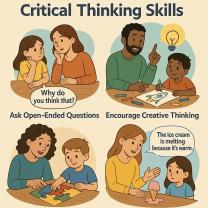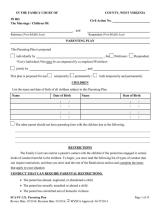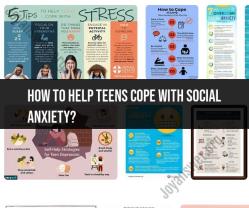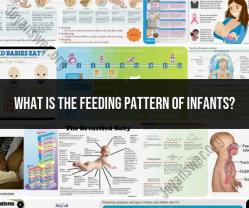What is a typical teen behavior?
Typical teen behavior can vary widely from one individual to another, as adolescents are unique and influenced by various factors, including their upbringing, culture, and personal experiences. However, there are some common behaviors and characteristics often associated with teenagers during this stage of development:
Seeking Independence: Teens often desire more independence from their parents and caregivers. They may want to make decisions for themselves and explore their own identities.
Peer Influence: Adolescents are highly influenced by their peers. They seek approval and acceptance from their friends, which can sometimes lead to peer pressure and conformity.
Mood Swings: Hormonal changes during puberty can lead to mood swings and emotional ups and downs. Teens may experience heightened emotions and sensitivity.
Risk-Taking: Adolescents are more prone to taking risks and engaging in adventurous behaviors. This can include experimenting with drugs or alcohol, driving recklessly, or engaging in thrill-seeking activities.
Identity Exploration: Teens are often exploring their identities, including their values, beliefs, and interests. They may experiment with different styles, hobbies, or subcultures.
Social Media and Technology Use: Teens are often heavy users of social media and technology, which can impact their communication skills, self-esteem, and social interactions.
Pushing Boundaries: Testing limits and pushing boundaries is common during adolescence. This can involve challenging authority figures or questioning rules and norms.
Peer Relationships: Developing and navigating peer relationships becomes a central focus. Friendships, romantic relationships, and social dynamics are important aspects of teen life.
School and Academic Stress: The pressure to perform well academically can lead to stress and anxiety for many teenagers. Balancing schoolwork, extracurricular activities, and social life can be challenging.
Identity Formation: Adolescents are working on forming their own identities separate from their parents. This process may involve questioning and challenging family values and beliefs.
Self-Expression: Teens often express themselves through fashion, music, art, and other creative outlets. This can be a way for them to assert their individuality.
Sleep Patterns: Changes in circadian rhythms during puberty can lead to shifts in sleep patterns, with many teens experiencing a preference for staying up late and sleeping in.
Communication Styles: Teens may use unique slang and communication styles when interacting with peers. They may also have a preference for texting or using social media for communication.
Responsible Decision-Making: While some teens engage in risk-taking behaviors, others demonstrate responsible decision-making skills, especially when they have guidance and support from adults.
It's important to remember that not all teenagers will exhibit all these behaviors, and these characteristics can vary greatly from one individual to another. Furthermore, adolescence is a period of growth and development, and teens are still learning and maturing. Adults can play a significant role in guiding and supporting teenagers as they navigate the challenges and opportunities of this phase of life.
Typical Teen Behavior: Insights into Adolescence
Adolescence is a time of great change and development. Teenagers are going through many physical, emotional, and social changes. This can lead to a variety of typical teenage behaviors, such as:
- Mood swings: Teenagers are often more emotional than adults. They may go from feeling happy and excited to feeling sad and angry very quickly.
- Risk-taking behavior: Teenagers are more likely to take risks than adults. This is because their brains are still developing and they are not as good at assessing the consequences of their actions.
- Rebellion: Teenagers often rebel against their parents and other authority figures. This is because they are trying to establish their own identity and independence.
- Withdrawal: Teenagers may withdraw from their families and friends and spend more time alone. This is because they are trying to figure out who they are and what they want out of life.
- Experimentation: Teenagers often experiment with different things, such as drugs, alcohol, and sex. This is because they are trying to figure out what they like and dislike, and who they want to be.
It is important to note that not all teenagers will exhibit all of these behaviors. However, it is normal for teenagers to experience some of these behaviors. If you are concerned about your teenager's behavior, it is important to talk to them about it. You can also talk to their doctor or another trusted adult.
Here are some tips for understanding common teenage behavior:
- Remember that adolescence is a time of change and development. Teenagers are going through many physical, emotional, and social changes. This can lead to a variety of behaviors that may seem strange or confusing to adults.
- Try to see things from your teenager's perspective. Put yourself in their shoes and try to understand what they are going through.
- Communicate with your teenager. Talk to them about their feelings, their thoughts, and their experiences. Let them know that you are there for them and that you care about them.
- Set clear expectations and boundaries. Let your teenager know what you expect of them and what the consequences will be if they break the rules.
- Be consistent with your discipline. If you tell your teenager that they are grounded for a week, make sure that they stay grounded for a week.
- Be patient and understanding. It takes time for teenagers to learn and grow. Don't expect them to be perfect.
If you are concerned about your teenager's behavior, it is important to talk to them about it. You can also talk to their doctor or another trusted adult.













